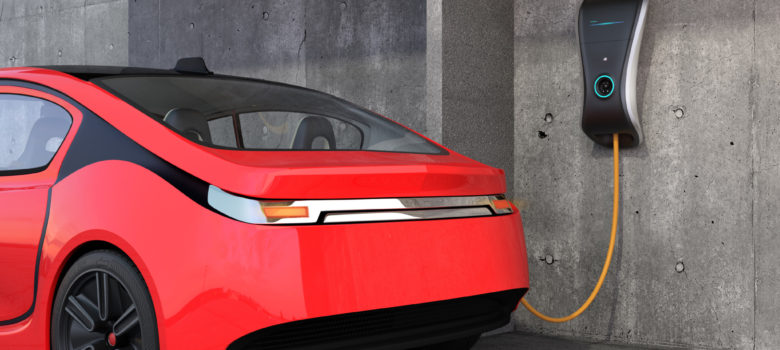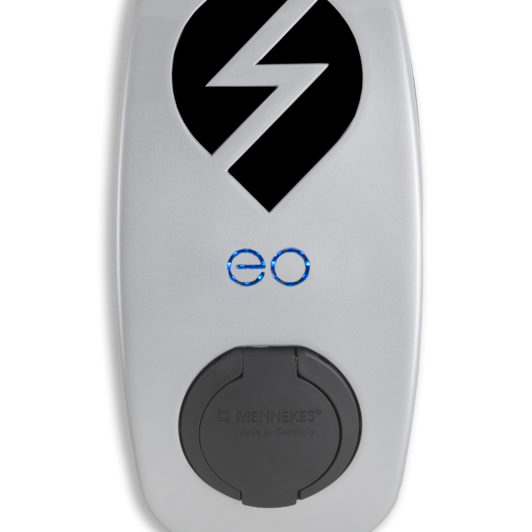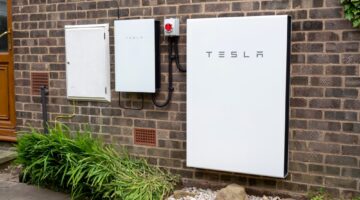
Charging an electric vehicle is pretty easy – just plug it in and wait. You can charge your car at a public charging station or at home via a domestic socket or a specially installed charging point. Where you charge your car affects the cost and how long it takes.
EV cars can be charged at public charging stations. Some are free, some charge a small fee, and they are available across the country. However, for convenience, most EV car owners do the majority of their charging at home. Electric cars have ranges of 200-300 miles, so home charging will suffice for day to day running, but may need supplementing on long journeys.
Charging an electric car at home
The average UK driver only travels 20 miles per day, so a lot of the time you won’t need to use public charging points; home charging will do just fine. There are two ways of doing it: the first is straight from the mains.
Charging an electric car from the mains
Many people choose to charge their electric vehicles – in a garage or driveway- from a domestic socket. Depending on how many volts your domestic power socket’s supply is, charging from the mains in the UK should take 6-9 hours. The easiest thing to do is to plug your car in overnight.
As a short-term or occasional solution, charging from the mains is fine. However, you can charge your car much faster if you install a specially-designed charging point. You can get a government grant of £500 towards a home charging point.
Installing a home EV charger
Home chargers – normally either 16-amps or 32-amps – can charge an electric vehicle from flat to full in 3.5 hours. Some are even quicker. Getting a charger installed on your property makes your life easier, for a number of reasons:
- It means you can charge your car overnight, meaning no having to wait around at a charging station in the middle of nowhere.
- It’s good if you live somewhere remote and don’t have access to nearby public charging points.
- It allows you to charge up to 2.5x faster than with a 3 pin plug.
- After the initial outlay on installation, you could save up to £1000 a year on fuel. You can expect to pay around £3 for a full charge, depending on the model of car and your electricity tariff. Clearly, this is far cheaper than petrol, and also cheaper than using public charging stations.
How much does it cost to install a home electric car charging point?
The Energy Saving Trust estimates the cost of charger and installation at £1-1400. This varies depending on the area and the model of charger, and prices are expected to come down as the measure is more widely adopted. You can get a grant for 75% of the cost of a charging point (up to a maximum of £500) from the government. Find out more here.
The price of chargers depends on their power and efficiency. There are loads of different models on the market. Some are wifi-enabled, meaning they can send information to a computer or phone app. Some are portable, meaning you can take them with you if you move house. It’s worth researching your options and also checking the lead length (between car and charger) is adequate for the spot you have chosen.
How much does it cost to charge my electric car at home?
The cost of home charging varies depending on your tariff (and, if on Economy 7, the time of day). An average electricity rate is 10p per kWh, meaning your car could cost as little as 2p per mile to run. Huge savings can be made on fuel – an estimated £1000 a year compared to petrol. Find more information on the costs of running an electric car here.
Charging an electric car in public
Charging an electric car at home is simple and cheap, but if you drive a lot, you will probably find yourself visiting a public charging point. These can be anywhere, including some at motorway service stations.
Where can I charge my electric car?
At the time of writing, there are well over 10,000 public charging points in the UK, and counting. Unless you are in a very remote area, chances are you will have access to one. You can find charging maps online.
How long does it take to charge an electric car from a public charging point?
Fast charging (Rate: 7-22kW): Fast charging points charge a car’s batteries from zero to full in around three to four hours. Most public charging stations offer this rate.
Rapid charging (Rate: 43-50kW): Not all electric cars are compatible with rapid charging, but those that are can be charged to 80% capacity in as little as 30 minutes.. This rate is not currently available everywhere.
How much does it cost to use public charging points?
Charging points (usually found at motorway service stations) are either free or run by public charging networks, who normally charge a small monthly subscription fee for unlimited charging. Others are pay-as-you-go through mobile apps. The cost of this is generally around £1-1.50 p/h.
Some charge quicker than others, and rapid charging points are slightly more expensive. These typically cost £6.50-7.50 for a 30 minute charge. Tesla’s Supercharger network is free to use for Tesla owners.
Installing an EV charging point
Interested in having an electric car charging point installed in your home? We have scoured the country for the best tradespeople, so that we can make sure we only recommend those we really trust.
If you would like us to find you a local installer to help install an EV charging point in your home, just fill in the form below and we will be in touch shortly!













No Comments yet! Be the first one.